
Politics in the Syrian Arab Republic takes place in the framework of a presidential republic with nominal multi-party representation in People's Council under the Ba'athist-dominated National Progressive Front. In practice, Syria is a one-party state where independent parties are outlawed; with a powerful secret police that cracks down on dissidents. Since the 1963 seizure of power by its Military Committee, the Arab Socialist Ba'ath Party has governed Syria as a totalitarian police state. After a period of intra-party strife, Hafez al-Assad gained control of the party following the 1970 coup d'état and his family has dominated the country's politics ever since.
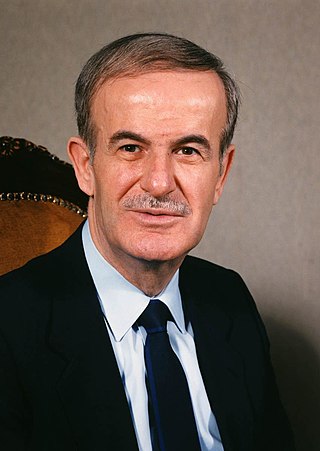
Hafiz al-Assad was a Syrian politician, military officer and revolutionary who served as the 18th president of Syria from 1971 until his death. He previously served as prime minister of Syria from 1970 to 1971, as well as regional secretary of the regional command of the Syrian regional branch of the Arab Socialist Ba'ath Party and secretary general of the National Command of the Ba'ath Party from 1970 to 2000. Hafiz al-Assad was a key participant in the 1963 Syrian coup d'état which brought the Syrian regional branch of the Arab Socialist Ba'ath Party to power in the country.

The Arab Socialist Baʿth Party was a political party founded in Syria by Mishel ʿAflaq, Ṣalāḥ al-Dīn al-Bīṭār, and associates of Zakī al-ʾArsūzī. The party espoused Baʿathism, which is an ideology mixing Arab nationalist, pan-Arab, Arab socialist, and anti-imperialist interests. Baʿthism calls for unification of the Arab world into a single state. Its motto, "Unity, Liberty, Socialism", refers to Arab unity, and freedom from non-Arab control and interference.
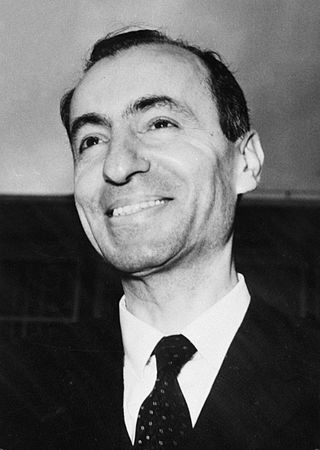
Michel Aflaq was a Syrian philosopher, sociologist and Arab nationalist. His ideas played a significant role in the development of Ba'athism and its political movement; he is considered by several Ba'athists to be the principal founder of Ba'athist thought. He published various books during his lifetime, the most notable being The Battle for One Destiny (1958) and The Struggle Against Distorting the Movement of Arab Revolution (1975).

Salah al-Din al-Bitar was a Syrian politician who co-founded the Arab Baʿth Party with Michel Aflaq in the early 1940s. As students in Paris in the early 1930s, the two formulated a doctrine that combined aspects of nationalism and socialism. Bitar later served as prime minister in several early Ba'athist governments in Syria but became alienated from the party as it grew more radical. In 1966 he fled the country, lived mostly in Europe and remained politically active until he was assassinated in Paris in 1980 by unidentified hitmen linked to the regime of Hafez al-Assad.
The National Progressive Front is a pro-government coalition of left-wing parties in Syria that supports the Arab nationalist and Arab socialist orientation of the government and accepts the "leading role" of the ruling Arab Socialist Ba’ath Party. The coalition was formed on the basis of the Popular Front model of Socialist Bloc, through which Syrian Ba'ath party governs the country by permitting nominal participation of smaller, satellite parties. The NPF is part of Ba'ath Party's efforts to expand its support base and neutralize prospects for any sustainable liberal or left-wing opposition, by instigating splits within independent leftist parties or repressing them.

The 1966 Syrian coup d'état refers to events between 21 and 23 February during which the government of the Syrian Arab Republic was overthrown and replaced. The ruling National Command of the Arab Socialist Ba'ath Party were removed from power by a union of the party's Military Committee and the Regional Command, under the leadership of Salah Jadid.

The 1963 Syrian coup d'état, referred to by the Syrian government as the 8 March Revolution, was the successful seizure of power in Syria by the military committee of the Syrian Regional Branch of the Arab Socialist Ba'ath Party. The planning and the unfolding conspiracy was inspired by the Iraqi Regional Branch's successful military coup.
Abd al-Qadir Qaddura was a Syrian politician who was a leading member of the Syria-based wing of the Ba'ath Party, in the era of President Hafez al-Assad. Qaddura served as speaker of the People's Council—the Syrian parliament—for much of the 1990s. He lost his post on the Ba'ath Party's leading board, the Regional Command, in 2005, as President Bashar al-Assad retired several main names from the Hafiz era.

The Corrective Movement, also referred to as the Corrective Revolution or 1970 coup, was a bloodless coup d'état led by General Hafez al-Assad on 13 November 1970 in Syria. Assad proclaimed to sustain and improve the "nationalist socialist line" of the state and the Ba'ath party. Ba'ath party adopted an ideological revision, absolving itself of Salah Jadid's doctrine of exporting revolutions. The new doctrine placed emphasis on defeating Israel, by developing Syrian military with the support of Soviet Union. Assad would rule Syria until his death in 2000, after which he was succeeded by his son Bashar al-Assad.
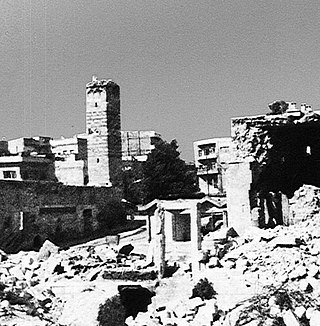
The Islamist uprising in Syria comprised a series of protests and armed revolts led by Sunni Islamists, mainly members of the Muslim Brotherhood, from 1976 until 1982. The uprising aimed to establish an Islamic Republic in Syria by overthrowing the Ba'athist government, in what has been described by Ba'ath Party as a "long campaign of terror".

The Arab Socialist Ba'ath Party, also referred to as the pro-Syrian Ba'ath movement, is a neo-Ba'athist political party with branches across the Arab world. The party emerged from a split in the Ba'ath Party in February 1966 and leads the government in Syria. From 1970 until 2000, the party was led by the Syrian president and Secretary General Hafez al-Assad. Until October 2018, leadership has been shared between his son Bashar al-Assad and Abdullah al-Ahmar. In 2017, after the reunification of the National and Regional Command, Bashar al-Assad became the Secretary General of the Central Command. The Syrian branch of the Party is the largest organisation within the Syrian-led Ba'ath Party.
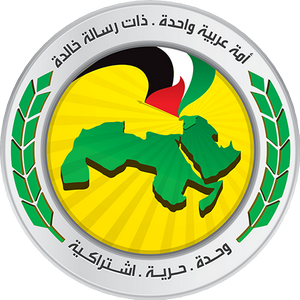
The Arab Socialist Ba'ath Party – Syria Region, officially the Syrian Regional Branch, is a neo-Ba'athist organisation founded on 7 April 1947 by Michel Aflaq, Salah al-Din al-Bitar and followers of Zaki al-Arsuzi. The party has ruled Syria continuously since the 1963 Syrian coup d'état which brought the Ba'athists to power. It was first the regional branch of the original Ba'ath Party (1947–1966) before it changed its allegiance to the Syrian-dominated Ba'ath movement (1966–present) following the 1966 split within the original Ba'ath Party. Since their ascent to power in 1963, neo-Ba'athist officers proceeded by stamping out the traditional civilian elites to construct a military dictatorship operating in totalitarian lines; wherein all state agencies, party organisations, public institutions, civil entities, media and health infrastructure are tightly dominated by the army establishment and the Mukhabarat.

Munif al-Razzaz was a Jordanian-Syrian physician and politician who was the second, and last, Secretary General of the National Command of the Arab Socialist Ba'ath Party, having been elected to the post at the 8th National Congress held in April 1965.
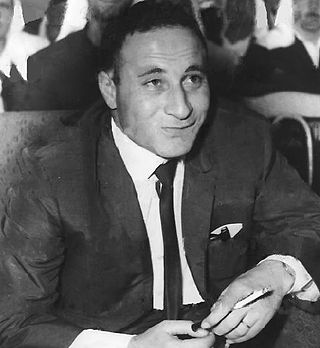
Abd al-Karim al-Jundi was a Syrian officer and a founding member of the Ba'ath Party's Military Committee which took over power in the country after the 1963 military coup. He also served as Minister of Agrarian Reform, and Commander of the National Security Bureau.

Ba'athism, also spelled Baathism, is an Arab nationalist ideology which promotes the creation and development of a unified Arab state through the leadership of a vanguard party over a socialist revolutionary government. The ideology is officially based on the theories of the Syrian intellectuals Michel Aflaq, Zaki al-Arsuzi, and Salah al-Din al-Bitar. Ba'athist leaders of the modern era include the former president of Iraq Saddam Hussein, former president of Syria Hafez al-Assad and his son, the current president of Syria, Bashar al-Assad.
Hammud al-Shufi was a Syrian politician, and is mostly known for his short stint as Regional Secretary of the Regional Command of the Syrian Regional Branch of the Arab Socialist Ba'ath Party in the early-to-mid 1960s.

Salim Hatum was a Syrian Army officer who played a significant role in Syrian politics in the 1960s. A member of the Syrian Regional Branch of the Arab Socialist Ba'ath Party, he was instrumental in the 1966 Syrian coup d'état that toppled the government of Amin al-Hafiz, also a Ba'athist. That same year he launched an insurrection from his home region of Jabal al-Druze against his colleagues who formed the new government but sidelined him from any major position. He fled Syria amid a warrant for his arrest, but returned in 1967 and was subsequently jailed and executed.

This article details the history of the Arab Socialist Ba'ath Party from its founding in 1947 to its dissolution in the 1960s.

This article details the history of the Syrian Regional Branch of the Ba'ath Party.















